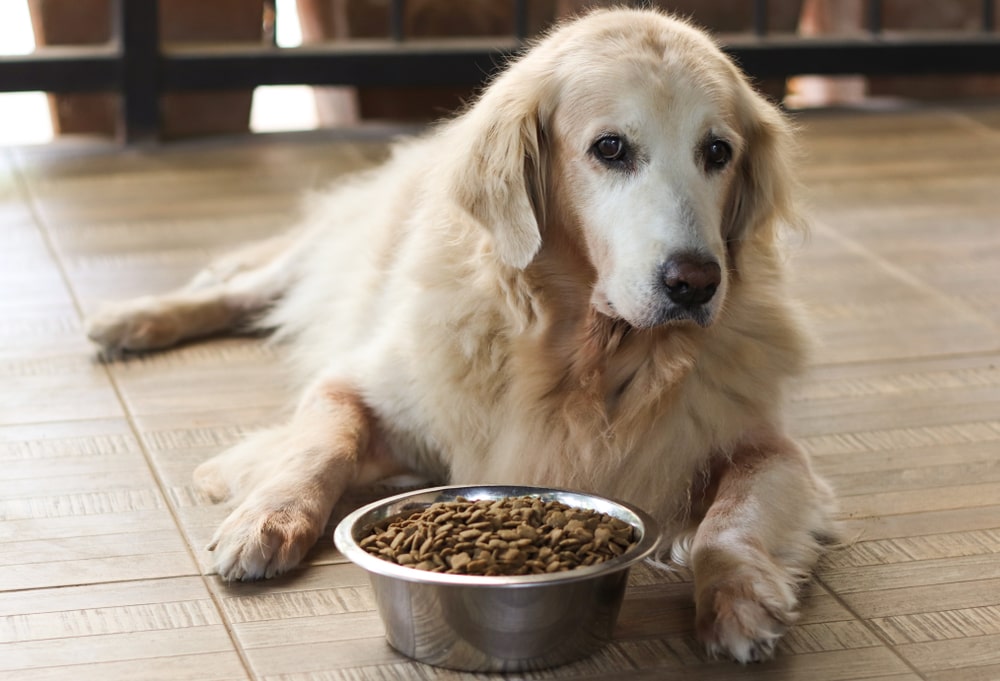Is your dog at that point in their life when they need special senior dog food?
Nutrition for pets is one of the best tools in your arsenal as an owner to ensure their lives are fulfilling.
Senior dog food may sound like a gimmick to some pet owners, but think about it like this: You have probably ensured that your pup has been getting an appropriate diet and an appropriate brand of food for years, so why should it be different as they have reached their senior years?
Nutrition is even more important for senior dogs, as it can help them prevent certain diseases, maintain their health, and even be used as the primary method in disease condition management!
Despite this, we here at The Geeky Gecko know how confusing it can be when your pup is aging and you have to start thinking about transitioning them to this type of specialized food.
And given that there are so many brands that market their food for older dogs with all types of work, from “aging” to “mature” and “senior,” it can easily be overwhelming.
To help you in this transition and to understand better why your bundle of joy may require a different type of diet, we have gathered some of the most commonly asked questions on this topic, along with a guide on when your dog is considered to be old and in need of it given their stature and life expectancy!
Strap in and continue reading to learn how you can provide your pup with the best golden tears and what role senior dog food plays in it!
Do you have an aging dog? Have you ever had to deal with changing your pup’s diet due to their age? How have your feeding habits changed as your dog has aged? Let us know your thoughts and answers in the comments!

Is senior dog food actually needed?
Generally speaking, the answer to this question is based on a lot of factors, and it depends from dog to dog. Your decision to switch to senior dog food may be based on a recommendation from your veterinarian, or it may be based on the fact that your pup has been diagnosed with a condition, and nutrition will play a huge role in how you can manage it.
Other factors that play a role in the reason why your pup may need or not need this type of food include lifestyle, health status, and disease risk (if there are no other conditions already involved).
Despite this, the reason why your dog may need a different type of food is because it has two specific goals that normal adult dog food does not address: it aids with increasing your dog’s longevity and it helps with managing or preventing a number of diseases.
The aim of the specialized food and whether or not your pup has a diagnosed condition are the most important factors in deciding whether they need to be transitioned to another food, so it is not a gimmick like some may try to make it seem.
What is the difference between the normal one and the one special for seniors?
What makes this type of food different from the normal one you have been giving it over the course of the last couple of years is generally in the nutrition specifications of the food, but it is not a given. Sometimes it may be the inclusion or exclusion of certain nutrients that would be more beneficial or detrimental to their health at this level.
For example, when it comes to dry food (kibble), normal adult dog food generally has a percentage of protein between 18 and 30%, which is a normal amount for an active, healthy adult dog. By comparison, most senior dog foods had a percentage between 18 and 23%, as protein does not play as much of an important role.
The same could be observed in the case of phosphorus and sodium, but there are a number of different types of nutrients that you need to keep an eye out for. Likewise, the situation may change if your dog is spayed or neutered, as the food formula changes given the situation.
No matter what, you should be reading the dog food labels as closely as possible, regardless of your dog’s age.
Likewise, you should discuss the change with your vet before you attempt it, as they could recommend a brand or certain things to be careful of given your dog’s health and certain diseases that could be influenced or managed through their food.

What health conditions can be helped with specialized food?
As your dog ages, there is a chance that they may have to deal with a number of diseases, or they may be prone to contacting some of them due to their age. Obviously, it is not a given that they may get these diseases, but there are a number of diseases that are associated with senior dogs that you need to keep an eye out for.
Senior dog food has the great perk that it helps manage or even prevent the apparition of a number of them. Some of the most common ones include:
- obesity;
- kidney disease;
- dental issues;
- arthritis;
- skin diseases;
- canine cognitive dysfunction (dog dementia);
- certain types of cancer.
It has been seen that in some cases, the nutritional changes associated with switching the food for senior dogs have slowed the progression or even the outcome of certain diseases, while in others, making the change to senior dog food has reduced the signs and symptoms associated with the conditions.
Despite our focus on the more serious diseases, senior dog food can also be useful when it comes to the symptoms associated with aging in dogs. A pup does not need to have seven dental issues or conditions for their teeth to have worn out by age or for them to have even lost some, if not all, of their teeth.
Specialized dog food for these dental cases will be useful when it comes to their comfort eating or even with being able to eat at all (as if they are missing teeth, canned wet food is more appropriate than kibble since they do not have to chew).
Likewise, in cases where your dog suffers from a condition (be it life-threatening or not), the nutritional values associated with senior dog food may be more appropriate to help with their condition, as certain ingredients can help with lessening inflammation, reducing pain, or supporting the likes of joints and bones.
What’s more, other foods may actually be useful as prevention, especially if your pup is at risk of certain diseases and their diet needs to contain low levels of protein but still be of high quality, which many of these formulas provide!

Types of dogs and when they need to be transitioned to senior dog food
When your pup needs to be switched to senior dog food is dependent on how old they are and when they are in their dog life stage. While it is generally considered that dogs enter their “mature” stage anywhere between 6 and 8 years old, anything over 8 is considered “senior.”
Yet, depending on their breed and size, this age interval may differ.
For small dogs (which weigh up to 20 pounds), up until 8 months, they are considered puppies. They continue into adulthood up until 10 to 12 years of age, and until 15 or 16, they enter their senior year. Anything after the age of 16 is considered a geriatric age for small dogs.
Medium dogs (21 to 50 pounds) are considered puppies until they are 1 year old and move into adulthood up until they are 7 to 9 years old. The golden years begin then, and they are considered seniors until 12–13 years old, with everything older being categorized as geriatric.
Large dogs are considered to weigh between 51 and 100 pounds, and they are puppies up until 15 months, with adulthood following up to 7 years. They become seniors until they are around 12 years old. With their geriatric characterization starting after.
Any dog whose breed’s description is over 100 pounds is considered a giant dog. They are considered puppies aged 18 to 24 months, with them entering their adult stage until they are 6. Seniority is up until 8 to 9 years, with them becoming geriatric over 9 years old.
These numbers are generic, and they may very well vary for your dog due to a lot of health and other factors. But it is good to keep them in mind so that you can discuss with your vet when you should make the transition to senior dog food!
All of us want our pups to have some extraordinary happy golden years. If you want more information about how to keep offering it to them, make sure you check out this book on the matter that we have found really helpful!
There are a lot of things that change once your dog starts to grow older, and we all need to be prepared for when that moment comes. If you want to know how you can maintain the health of your senior dog, make sure you check out our article on the topic here!












